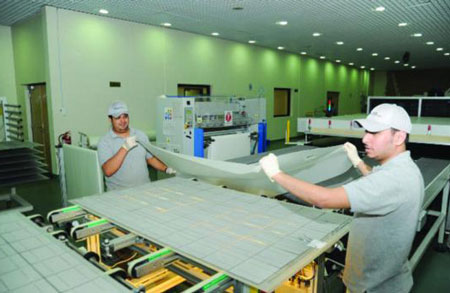| Nov 24, 2012 |
Saudi solar power project gets ISO certificate
|
|
(Nanowerk News) The Kingdom's solar power project has been accredited with International ISO certification, the King Abdulaziz City For Science and Technology (KACST) announced yesterday.
|
|
The overall quality certificate (ISO 9001-2008) was issued by the TÜV SÜD, which is one of the world's leading technical service organizations. Headquartered in Munich, Germany, TÜV has more than 17,000 employees across 800 locations, partnering clients wherever they are in the world.
|
|
An official from the KACST said that the ISO certificate will be a major landmark in the development of solar energy projects of the Kingdom, which also signifies the global recognition to the ongoing solar project. The Kingdom's solar projects benefit from nanotechnology provided by the KACST.
|
|
Saudi researchers and engineers work at the KACST's solar panel manufacturing plant which operates in line with the latest international standards, he said.
|
|
The plant is a key component of the Solar Powered King Abdullah Initiative for Desalination.
|
|
"It is a turning point for the Kingdom in this field," he said, adding that the Kingdom has its patent rights and it heralds the beginning of self-reliance in the field of solar energy.
|
|
He said the solar plant, which was established in 2010 with an initial annual production capacity of 3MW, was later upgraded to 12MW. The photovoltaic cells manufactured in the plant use advanced technology and are environment friendly and help reduce greenhouse gas emissions.
|
 |
| Workers handling solar panels in the KACST solar panel manufacturing plant.
|
|
"KACST will also put at the disposal of SWCC all its potential to benefit from its technology developed at the Solar-Powered King Abdullah Initiative for Desalination in all the plants decided to be established in Haqel, Dhuba and Farasan in addition to the plant in Al-Khafji," KACST President Mohamed Ibrahim Al-Suwaiyel said in a statement recently.
|
|
Using solar energy, he said the Kingdom could attract foreign investors to the Kingdom by way of its cost effective energy supply.
|
|
KACST set up a unit to produce 3MW flat solar panels at the solar village in Al-Aiyyna, where it began production from 2011 with a production capacity of 12,000 panels per year.
|
|
He said KACST aims to set up a world class plant to produce solar panels with a capacity of 120MW in Al-Aiyyna solar village on an area of 75,000 sq. meters.
|
|
KACST researchers applied for registration of 49 patents on nanotechnology. It aims to build a generation of technicians and researchers equipped with the latest technologies to run and implement such projects.
|
|
SWCC Gov. Abdul Rahman Al-Ibrahim said the three new solar-powered desalination plants to be established would use alternative energy sources and would not depend on oil.
|
|
These solar-powered desalination plants are established to support oil- and gas-powered stations, and we have plans to establish similar plants inside the existing desalination complexes," he said.
|
|
He added that the application of new technology would enable the SWCC to save a lot of energy. "For example, Yanbu-3 plant can save 5 million barrels of oil annually," he said.
|
|
SWCC, with a more than SR 60 billion investment, is the world's largest producer of desalinated water, accounting for 18 percent of total global output and 41 percent of the total production of GCC states.
|
|
The corporation also supplies 5,000MW, or 9 percent of the Kingdom's total power production. The SWCC works around the clock to ensure adequate supply of water to Makkah and the holy sites.
|
|
Recently, the Shoura Council urged the Ministry of Water and Electricity to use solar energy for power generation.The consultative body stressed the need for producing electricity at the new desalination plants.
|
|
According to the amended Electricity Law, dual production should be made mandatory for all desalination and electricity projects established on the Kingdom's coasts.
|
|
Since 2007, KACST has undertaken infrastructure projects for nanotechnology and had also invited Saudi universities to attend specialized courses on nanotechnology
|

